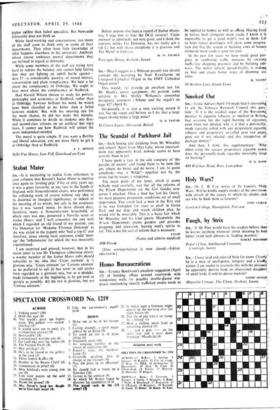Stabat Mater
SIR,-12 is interesting to realise from references in your columns that Rossini's Stabat Mater is exerting once again its 'riveting grip.' Fifty or sixty years ago it was a great favourite, at any rate in the South of. England, with Nonconforrriist choirs, who performed the rollicking work of course without any idea of its doctrinal or liturgical significance, or indeed of the meaning of its words, but safe in the assurance that it was 'sacred' music. In those distant days, therefore, many a Nonconformist household, of which ours was one, possessed a Novelloscore of Stabat Mater; and I well remember the awe -with which I regarded an old friend of my parents, one- Flo Donovan (or 'Madame Florence Donovan' as she was styled in the papers) who 'had a top C and therefore, alone among local sopranos, could 'man- age' the Inflammatus' for which she was invariably requisitioned.
I am surprised and grieved, however, that in his recent letter to you Mr Thompson (otherwise clearly a worthy member of the Stabat Mater cult) should subscribe to the idea that 'Cujus animam' is 'a glorious aria.' Cujus animam' (or 'Curious animam' as we preferred. to call it) has never in cult circles been regarded as a glorious aria, but as a mistake, made fortunately at the beginning, to be got over as quickly as possible. All the rest is glorious, but not 'Curious animam. Before anyone else buys -a record nf $tabat Mater; may f urge him to hear the DtX) version? 'Cujus animam' is admittedly not very good, and I think the soprano, unlike Flo Donovan, has not really got a top C; but with those exceptions it is glorious and `Eia Mater' is frabjous.
Watergate House, Bosham, Sussex M. W. PALMER










































 Previous page
Previous page